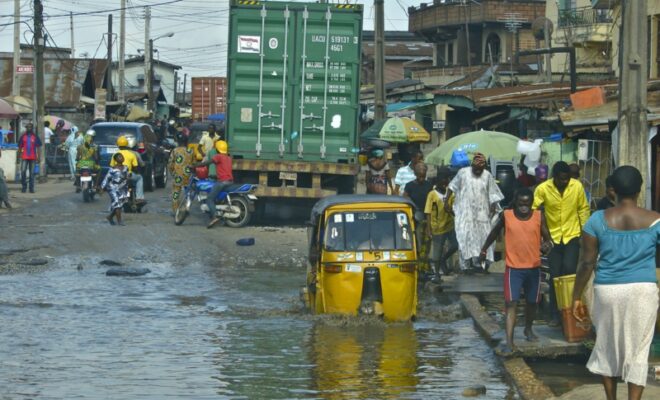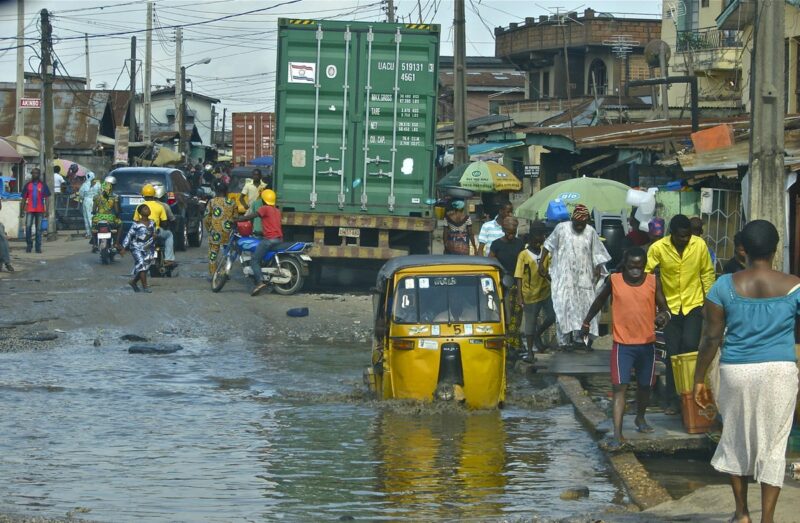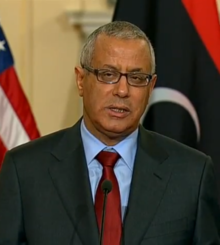Where do Nigeria’s frontrunners stand on climate change?

Only one candidate devotes more than a few passing mentions to climate change in their manifesto.

Extreme weather events leading to devastating flooding in Nigeria have become 80 times more likely due to climate change according to scientists. Credit: ISeeAfrica.
When Nigeria’s new president is sworn in on 29 May 2023, following elections on 25 February, he will inherit a country facing multiple interrelated challenges, from fuel scarcity and stretched public finances to widespread insecurity and poverty. Though perhaps less immediately obvious, he will also take over the reins of a nation suffering from the effects of climate change.
Nigeria is already facing rising temperatures and more extreme weather events. In recent years, several regions have been devastated by floods, as other areas confront deadly drought and desertification. These challenges will only increase, raising the prospect of economic shocks, food insecurity, widespread displacement, and increased insecurity.
Given the size of the issue, it is perhaps unsurprising that a 2022 Afrobarometer survey found that 85% of Nigerians who have heard of climate change (albeit just 30% of total respondents) believe the government must do “a lot more”. A sizeable 71% say the “government must take action now to limit climate change even if it is expensive”.
In Nigeria, climate action is coordinated by the federal government. This top-down approach means the president’s beliefs and policies on the issue are of paramount importance. What do the four main candidates in the upcoming election say about climate change in their manifestos?
The manifestos
Bola Ahmed Tinubu
Renewed Hope 2023, the manifesto of the ruling All Progressives Congress candidate Bolu Tinubu, mentions climate change four times with little elaboration. On three of those occasions, the issue is cited as one of a list of challenges facing Nigeria’s agricultural sector. For instance, it talks of how policies like the Irrigate Nigeria Project and Farm Nigeria Project will be aimed at boosting agriculture in part by mitigating the effects of climate change.
The fourth mention of the issue is in relation to Tinubu’s ten foreign policy priorities. Nigeria should, he says, “become a voice advocating for a more attentive international policy regarding climate change… so that Africa and Nigeria are not asked to pay a heavy cost for the environmental damage caused by nations on other continents”. The document does not add any further detail to this point. Elsewhere, the manifesto mentions completing the Great Green Wall, recommits to Nigeria’s plan to become carbon neutral by 2060, and says the party would enhance solar energy by focusing on “grid connectedness” and “taking advantage of mini-grid and interconnected mini-grid solutions”.
Atiku Abubakar
In Atiku Abubakar’s manifesto, A Covenant with Nigerians, the main opposition People’s Democratic Party (PDP) flag-bearer devotes a whole section to climate change as well as one for the environment.
On the international front, Atiku’s manifesto reaffirms Nigeria’s responsibilities under the 2015 Paris Agreement, its Nationally Determined Contributions (NDCs), and its target of reaching net zero emissions by 2060. He believes this latter goal signals the country’s “commitment to providing leadership in climate governance both regionally and internationally” and he vows to engage the African Union towards “galvanizing and articulating Africa’s position on climate change”. He adds, however, that he will seek financial support to meet Nigeria’s commitments and pursue implementation of them in a way that “does not inhibit the nation’s economic growth and development”, though does not add further detail to this tension.
Looking domestically, Atiku’s manifesto cites the climate-related challenges of “forest despoliation and depletion, desert encroachment, oil pollution of Niger Delta region, soil degradation and erosion menace”. Among the policies outlined in the climate change section of the manifesto, he promises to work with different levels of government to initiate a “comprehensive National Policy on Clean Cities” that would “set minimum standards for city cleanliness in line with best practices around the world”. He describes a “behavioural change campaign” that would “aggressively campaign for greener environment through the traditional and new media outlets” in order to boost civil society participation and young people. And he lists other initiatives briefly, such as the rehabilitation of devastated areas, encouraging further research into the “geophysical nature of different environments”, strengthening cross-border projects like the Great Green Wall, and harnessing fundraising opportunities from global emissions trading schemes.
Peter Gregory Obi
The manifesto of the Labour Party’s Peter Obi, who has emerged as a popular third-party candidate to interrupt the usual two-horse race, refers to climate change on three fairly brief occasions. Our Pact with Nigerians includes ten “pledges”, one of which is to “Engineer the transition of Nigeria from fossil fuel dependency to climate and eco-friendly energy use”. Later, in a section on an agrarian revolution, Obi notes Nigeria’s vulnerability to climate change but also the “enormous opportunity to unleash the green growth transition and boost prosperity”. To realise this, he vows to establish “a Green Army tasked with identifying all opportunities to tap into the 3 trillion dollars international climate finance to engineer economic growth and employment for millions of our youths and transition our country to the green epoch”. Finally, in talking about infrastructure, the manifesto promises to develop 100,000 mini-grids across Nigeria by the end of 2024, to support the private sector to deploy 15 million solar standalone systems, and to deliver on the country’s obligations under the Paris Agreement.
Beyond these headline pledges – and a few nods to the renewable energy sector – the document does not elaborate further on how these initiatives would work, nor does it dwell on other challenges and opportunities presented by climate change.
Rabi’u Musa Kwankwaso
The manifesto of Senator Rabi’u Musa Kwankwaso of the New Nigeria People’s Party mentions climate change five times. The first is as the eighteenth of his twenty pledges in which he says: “we shall work assiduously to combat climate change and its negative impact such as flood, erosion, desertification etc. We will work to improve the conditions and, preserve the natural beauty, of the environment. We shall beautify our cities and ensure the creation of parks and gardens as well as green belts across the country. We shall ensure the preservation of the natural flora and fauna of our country and work deliberately to save all endangered species.”
Beyond committing to a Just Transition “to achieve a clean long term energy balance” later on, there is little in the rest of the 162-page manifesto that builds on this pledge. The other occasions in which climate change is mentioned, it is listed as one of myriad challenges related to other issues – namely security, the oil and gas sector, and water resource management.
A passing focus
As a whole, the four frontrunners in Nigeria’s presidential election are relatively muted when it comes to climate change. They all mention the issue in their manifestos, but – with the exception of Atiku – speak of it largely in passing. They do not consider the devastating effects of climate change – or the opportunities that may arise from global attention on the problem – to be a front-burner issue in the 2023 election. Their related policies appear rhetorical, and are low on detail.
This may have little effect on the success of their campaigns. Few voters read candidates’ manifestos and only a minority of voters are familiar with the notion of “climate change”. Nonetheless, all 200 million-plus Nigerians are deeply affected by the direct or indirect impacts of extreme weather events, deforestation, drought, floods, sea level rise, and unpredictable rainfall, whether or not they connect it to global carbon emissions. And, ready or not, the next president will likely have to deal with a fast-changing world and biblical-level catastrophes such as the flooding that recently affected over 2.5 million Nigerians across 25 states last year.







Dear Oluwaseun, great reading! This is Bernhard Poetter, editor with Germany based Climate Table, a weekly professional briefing on climate issues. You can find us on German and English under http://www.table.media and see what we are doing.. I was wondering if you had a chance to write us a piece next week on the outcome of the elections and what climate policy means for the new president. We would be interested in an assessment of how climate will do on the new president´s agenda, what needs to be done in terms of climate policy, what impact of climate change you already see in Nigeria, what the public´s view on this is, what this might mean for Nigeria´s international policy in the UNFCCC… quite a lot of questions… we would be looking for omething like 800 words and could pay 400 Euros for it. If you are interested and find the time, just drop me a line and we can see where this takes us.. lookign forward to reading from you, best, Bernhard